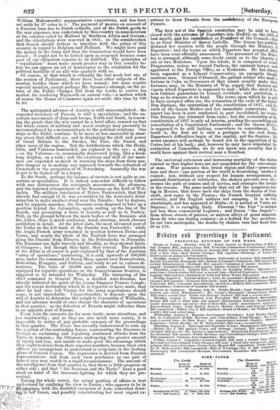The first act of the Spanish revolution may be said
to have closed with the entrance of Espartero into Madrid, on the 29th of last month, and his installation as President of the Council--that is, as First Minister of Queen Isabella. The Queen has publicly declared her reunion with the people through the Ministry of Espartero ; and the terms on which Espartero has accepted dace have been semi-officially announced. The personnel of the Minis_ try is arranged, although some doubt exists as to the identity of one or two Ministers. Upon the whole, it is composed of sound Progresistas, unless we regard Pacheco, the eminent lawyer now appointed to the Foreign Office, as a Moderado. He has always been regarded as a Liberal Conservative, an energetic though cautious man. General O'Donnell, the gallant soldier who made fortune in Cuba as Governors of that island usually make their fortunes, may, in the Ministry of War, supply that decision and vigour which Espartero is supposed to lack ; while the chief of the new Cabinet guarantees its honour, rectitude, and patriotism, so long as he remains at its head. The terms upon which he is said to have accepted office are, the revocation of the exile of the Infant Don Enrique, the restoration of the constitution of 1837, and the exile of the Queen Mother and her immediate connexions. This report has been in part confirmed, in part invalidated, by events. Don Enrique has returned from exile ; but the restoration of the constitution of 1837 is only ad interim, pending the assembling and consultation of a Constituent Parliament ; and the Queen Mother is supposed to be still lurking somewhere in concealment. The truth is, the first act is only a prologue to the real dram Espartero's difficulties begin at the capital, not the frontier; his worst enemies will perhaps be found not in the opposition of the Cortes but at his back ; and, however he may have stipulated the extinction of Camarillas, we do not know any security that he could have against their revival near a Bourbon.


























 Previous page
Previous page